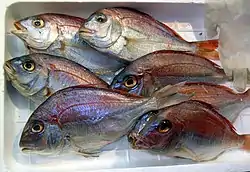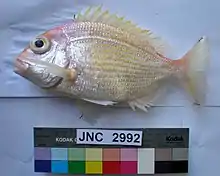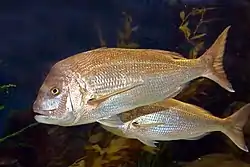Sparidae
The Sparidae are a family of fish in the order Perciformes, commonly called sea breams and porgies. The sheepshead, scup, and red seabream are species in this family. Most sparids are deep-bodied compressed fish with a small mouth separated by a broad space from the eye, a single dorsal fin with strong spines and soft rays, a short anal fin, long pointed pectoral fins and rather large firmly attached scales.[1] They are found in shallow temperate and tropical waters and are bottom-dwelling carnivores.
| Sparidae | |
|---|---|
%252C_franja_marina_Teno-Rasca%252C_Tenerife%252C_Espa%C3%B1a%252C_2022-01-09%252C_DD_49.jpg.webp) | |
| Diplodus cervinus | |
| Scientific classification | |
| Domain: | Eukaryota |
| Kingdom: | Animalia |
| Phylum: | Chordata |
| Class: | Actinopterygii |
| Order: | Spariformes |
| Family: | Sparidae Rafinesque, 1810 |
Hermaphrodites occur in the Sparidae. Protogyny and protandry appear sporadically through this lineage of fish.[2] Simultaneous hermaphrodites and bidirectional hermaphrodites do not appear as much, since Sparidae are found in shallow waters.[2] Species of fish that express a hermaphroditic condition usually "lack a genetic hardwire", so ecological factors play a role in sex determination.[3]
Most species possess grinding, molar-like teeth.[4] Some of the species, such as Polysteganus undulosus, have been subject to overfishing, or exploitation beyond sustainable recovery.[5]
Genera


The family Sparidae contains about 155 species in 38 genera:
- Acanthopagrus Peters, 1855
- Amamiichthys Tanaka & Iwatsuki, 2015 [6]
- Archosargus Gill, 1865
- Argyrops Swainson, 1839
- Argyrozona Smith, 1938
- Boops Cuvier, 1814
- Boopsoidea Castelnau, 1861
- Calamus Swainson, 1839
- Centracanthus Rafinesque, 1810
- Cheimerius Smith, 1938
- Chrysoblephus Swainson, 1839
- Crenidens Valenciennes, 1830
- Cymatoceps Smith, 1938
- Dentex Cuvier, 1814
- Diplodus Rafinesque, 1810
- Evynnis Jordan & Thompson, 1912
- Gymnocrotaphus Günther, 1859
- Lagodon Holbrook, 1855
- Lithognathus Swainson, 1839
- Oblada Cuvier, 1829
- Pachymetopon Günther, 1859
- Pagellus Valenciennes, 1830
- Pagrus Cuvier, 1816
- Parargyrops Tanaka, 1916
- Petrus Smith, 1938
- Polyamblyodon Norman, 1935
- Polysteganus Klunzinger, 1870
- Porcostoma Smith, 1938
- Pterogymnus Smith, 1938
- Rhabdosargus Fowler, 1933
- Sarpa Bonaparte, 1831
- Sparidentex Munro, 1948
- Sparodon Smith, 1938
- Sparus Linnaeus, 1758
- Spicara Rafinesque, 1810
- Spondyliosoma Cantor, 1849
- Stenotomus Gill, 1865
- Virididentex Poll, 1971
Cookery
The most celebrated of the breams in cookery are the gilt-head bream and the common dentex.[7]
See also
References
- Bray, D.J.; Gomon, M.F. (2012). "Breams, SPARIDAE". Fishes of Australia. Archived from the original on 18 December 2013.
- de Mitcheson, Yvonne Sadovy; Liu, Min (Fall 2008). "Functional hermaphroditism in teleosts". Fish and Fisheries. 9: 1–43. doi:10.1111/j.1467-2979.2007.00266.x.
- Mank, Judith E.; Promislow, Daniel E. L.; Avise, John C. (Winter 2005). "Evolution of alternative sex-determining mechanisms in teleost fish". Biological Journal of the Linnean Society. 87: 83–93. doi:10.1111/j.1095-8312.2006.00558.x.
- Johnson, G. D. & Gill, A. C. (1998). Paxton, J. R. & Eschmeyer, W. N. (eds.). Encyclopedia of Fishes. San Diego: Academic Press. p. 184. ISBN 0-12-547665-5. Eating the head is known to cause hallucinations, lasting many days.
- Hogan, C. M. (2010): Overfishing. Encyclopedia of Earth. National Council for Science and the Environment.
- Tanaka, F.; Iwatsuki, Y. (2015). "Amamiichthys, a new genus for the sparid fish Cheimerius matsubarai Akazaki 1962, and redescription of the species, with designation of a neotype". Zootaxa. 4007 (2): 195–206. doi:10.11646/zootaxa.4007.2.3.
- Davidson, A. Mediterranean Seafood, Penguin, 1972. ISBN 0-14-046174-4, pp. 86–108.
